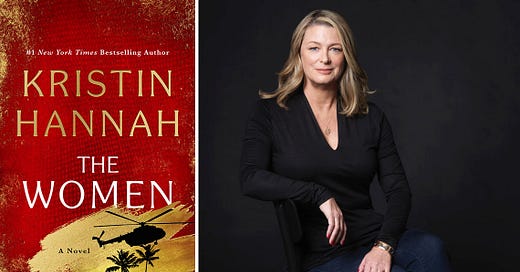By Guest Contributing Reviewer Marc S. Friedman
Compelling. Entertaining. Sad. Informative. Joyous. Emotional. Spellbinding.
These words best describe The Women, a monumental new Vietnam War novel by the immensely talented Kristin Hannah, who also wrote The Nightingale and other acclaimed novels.
The Women is a masterfully crafted and emotionally gripping novel that sheds light on the often overlooked and heroic contributions of women, particularly nurses like Frances “Frankie” McGrath, during the Vietnam War.
At the heart of this powerful story is Frankie, a young nurse from a privileged background who volunteers to serve in Vietnam. Through Frankie’s eyes, Hannah paints a vivid picture of the war's brutal realities and the lasting impact it had on those who served.
Frankie McGrath is a compelling, magnetic, and multifaceted protagonist whose journey is both inspiring and heartbreaking. From the moment she decides to volunteer as a nurse, Frankie is driven by a keen sense of duty and a desire to make a difference.
Her initial idealism, however, is soon shattered by the harsh realities of war. Hannah does an excellent job of depicting Frankie’s transformation from a naïve young woman to a seasoned and resilient nurse.
In Vietnam, Frankie faces unimaginable challenges. The novel vividly describes her experiences in mobile army surgical hospitals (MASH), where she works tirelessly to save lives amid the chaos of battle.
Hannah’s meticulous research is evident as she portrays the grueling conditions, the constant influx of casualties, and the emotional toll of Frankie’s work. Despite the fear and exhaustion, Frankie remains dedicated to her patients, displaying her extraordinary strength and compassion.
One of the most profound aspects of The Women is its exploration of the emotional and psychological impact of the Vietnam War on Frankie. The novel delves deep into her internal struggles, portraying her nightmares, flashbacks, and the pervasive sense of alienation she feels upon returning home. Hannah’s depiction of Frankie’s post-traumatic stress disorder (PTSD) is both realistic and empathetic, providing a disturbing look at the long-term effects of war.
Frankie’s reintegration into civilian life is fraught with difficulty. She returns to a society that is indifferent, if not hostile, to the sacrifices she and her fellow nurses made. She is spat upon and disrespected. In fact, when she sought help at a nearby V.A. hospital, she was turned away by a hospital administrator who claimed there were no women who served in Vietnam.
The lack of recognition and understanding she encounters only exacerbates her trauma, making it even harder for her to find a sense of peace and normalcy. Through Frankie’s experiences, Hannah highlights the often-overlooked struggles of female veterans and the inadequate support they received.
Amid the darkness of war, The Women also celebrates the bonds of friendship and solidarity that sustain Frankie and her fellow nurses, especially her bunkmates Ethel and Barb.
The extraordinary camaraderie among these women is a central theme of the novel, providing a source of strength and solace in the face of unimaginable adversity. Hannah captures the deep connections forged in the crucible of war, showing how these relationships help Frankie navigate the challenges she faces both during and after the conflict.
The theme of resilience is especially prominent in Frankie’s story. Despite the immense physical and emotional hardships she endures, Frankie’s spirit remains unbroken. Her journey is one of survival and recovery, as she gradually learns to cope with her trauma and rebuild her life.
Hannah portrays this process with sensitivity and depth, offering a hopeful message about the possibility of healing and growth. I believe that, today, the word “hero” is overused. But in Frankie’s case, it is well-deserved.
The Women is set against the backdrop of the 1960s and 1970s, a period of significant social and political upheaval in the United States. Through Frankie’s eyes, readers gain a deeper understanding of the era’s cultural shifts, including the feminist movement and the anti-war protests. The novel effectively captures the complex interplay between these broader societal changes and the firsthand experiences of its characters.
One of the most impactful historical events depicted in the novel is the anti-war protest in Washington, D.C. in 1970, which resulted in 12,000 arrests. I was there, marching side-by-side with the Vietnam Veterans Against the War and others.
Those arrests included many of my George Washington Law School classmates and even a law professor. As tear gas wafted through our campus just five blocks from the Nixon White House, we heard the news about the Kent State Massacre and the killing of four and wounding of nine unarmed college students by National Guardsmen. We feared for our lives.
This protest is a pivotal moment in the story, highlighting the growing public dissent against the Vietnam War and the government's heavy-handed response. Frankie, now a veteran, finds herself drawn to the protest, seeking a sense of solidarity, and understanding among those who opposed the war. The scenes describing the protest are vivid and powerful, capturing the tension, fervor, and chaos of the time. They are indelibly etched in my mind.
Hannah’s portrayal of the Vietnam War itself is unflinchingly realistic. She does not shy away from depicting the brutality and moral ambiguity of the conflict, offering a nuanced perspective on its impact. The historical accuracy and detail in the novel provide a rich and immersive reading experience, making the story of Frankie and her fellow nurses even more compelling.
Reading The Women was an emotional journey for me. At times, I smiled and laughed at the moments of camaraderie and resilience shared by Frankie and her fellow nurses.
I became angry and upset at the injustices and horrors they faced. I felt deep shame for my countrymen and their treatment of returning veterans. The novel’s depiction of societal neglect and indifference was heartbreaking.
Two pages from the end, I found myself in tears, overwhelmed by the poignant conclusion of Frankie’s story that I will leave to the reader to discover. The emotional depth of Hannah’s writing will have a lasting impact on me, making The Women a novel I will not soon forget. Nor will any reader forget the experience of The Women.
Kristin Hannah’s The Women is a deeply impactful novel that brings to light the often-overlooked contributions and sacrifices of women during the Vietnam War, now memorialized in a sculpture near the large Vietnam Veterans Memorial in Washington, D.C.
The Women is a tribute to the unsung heroines of the Vietnam War and a poignant reminder of the enduring human spirit. For readers interested in historical fiction, women’s history, or stories of personal triumph over adversity, this novel is a must-read. Hannah’s skillful storytelling and richly drawn characters make The Women a memorable and moving addition to the literature on the Vietnam War.
Marc S. Friedman was a lawyer for five decades. He is currently a writer and an Executive Coach. Marc graduated from The Johns Hopkins University with a B.A in Philosophy and from The George Washington University Law School with a Juris Doctor degree, with Honors.
Since January of 2020, Great Books, Great Minds has provided subscribers community, connection and conversation around books for free—no paywall.
But our future relies on you. At $6.00/month or $60.00 per year, please help me sustain our vision of impacting one million readers worldwide by 2030.
Diamond Michael Scott, Global Book Ambassador and Influencer







Big Kristin Hannah fan here. I read The Women a couple of months ago.
Everything you wrote about the book is absolutely true. I love the story interwoven with popular song references and changing of fashion and her agony of being misunderstood upon her return from deployment.
My only gripe about the whole book is that the helicopter silhouette on the cover appears to be a Soviet-made Mil Mi-8, a helicopter that our heroine Frankie would’ve had vanishingly rare contact with at the field hospitals where she was stationed in Vietnam because the Mil-8 was only just beginning to be introduced into the Soviet Air Force in 1968, which was at the tail end of Frankie’s deployment, and too late to have much impact in South Vietnam. A better option for the cover would’ve been an American-made helicopter like the iconic Bell UH-1 Huey, a Boeing CH-46, or a Boeing CH-47, all were actively flying during the Vietnam war. It may have been a hasty oversight by the jacket designer Michael Storrings showing his lack of aviation knowledge while copying and pasting from Shutterstock. Again, it’s my only gripe about the whole book. But because I’m an aviation geek, noticing tiny details like this gives me pleasure. I’m settling into The Four Winds right now. I’ll take my answer off the air.
I made the purchase